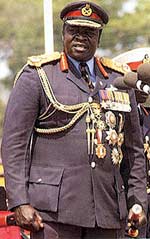Idi Amin ‘joins’ Museveni’s election campaigns
By George Murumba
13th Dec 2010
Self-styled Field Marshal Idi Amin has been dead for years. But according to some analysts, Amin has made a dramatic come-back from the beneath the grave to join President Museveni’s 2011 election campaigns.
President Yoweri Museveni’s critics claim that he and his cadres deliberately suggest that a vote for change in the February polls could mean the return of merciless military rule, like Amin’s 1971-1979 tenure.
“…The National Resistance Movement knows how to manage the army”, Museveni said on November 18th at a campaign rally in northern Uganda. He then reminded the crowd of his role in toppling “Field Marshall” Amin, who was forced into exile in 1979 – after a brutally unpredictable rule during which around 300 000 people were killed. Amin died in Saudi Arabia in 2003.
“…I was here in 1973 fighting Amin. You know I don’t compromise with wrongdoers… I fought Amin because of my firm stand against criminality”, Museveni said.
While campaigning, Museveni consistently boasts about his anti-Amin drive, but also suggests that choosing a leader who cannot control the military could plunge Uganda back into Amin-style tyranny.
“…Uganda is not easy to manage. How can you be overthrown by your own army and you want to lead the country again? We have been here for 24 years unshaken. Why should you not trust us”, Museveni asked while taking a swipe at UPC party President Dr Olara Otunnu for serving in the Uganda People’s Congress party ousted in Amin’s 1971 coup.
On November 16th, just two days before his swipe at Otunnu, Museveni mocked his most fierce presidential challenger Kizza Besigye for suggesting that the army backed him.
“…Besigye said 90 percent of the army supports him but within two weeks, he was crying that the army had arrested him. What happened to the 90 percent?” Museveni asked.
Bugweri MP Abdu Katuntu however said Museveni’s references to Amin and to similar military oppression during the 1980-1985 reign of Milton Obote is simply blackmail. “…The implication is, ‘If you don’t vote for us, those (politicians) who could come in will allow those terrible things to happen again”, Katuntu said.
Katuntu also argues that the irony of Museveni’s tactic is that his army has also been linked to massive human rights abuses. “…For the ruling party to say that the Uganda People’s Defence Forces has a perfect record is simply ridiculous”, Katuntu said.
Scores of reports from local and international organisations implicate the UPDF in serious misconduct, notably during the conflict in northern Uganda.
But Katuntu was particularly incensed by General David Tinyefuza comments during a November parliament session. Speaking about Amin and Obote, Tinyefuza said, “…there was a time when those who criticised the government did not get back to their homes at the end of the day. It can happen again”.
Political analyst Bernard Tabaire said although much of the February 2011 electorate are too young to remember the Amin or Obote years, Museveni’s “Amin” strategy will garner votes.
“…Even for young people, if you have a sister or mother who was raped by soldiers that forms your perception of politics. Ugandans of that age remember these (atrocities) and Museveni says things are not as bad as they used to be because of me”, Tabaire explained.
According to Tabaire, Museveni’s narrative is therefore persuasive to most rural voters over 35. END. Please log into www.ugandacorrespondent.com every Monday to read our top stories and anytime mid-week for our news updates.
![]()


